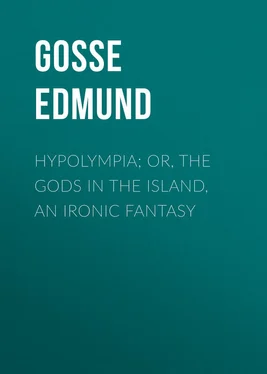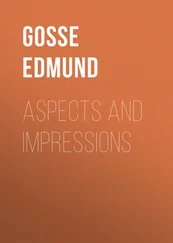Edmund Gosse - Hypolympia; Or, The Gods in the Island, an Ironic Fantasy
Здесь есть возможность читать онлайн «Edmund Gosse - Hypolympia; Or, The Gods in the Island, an Ironic Fantasy» — ознакомительный отрывок электронной книги совершенно бесплатно, а после прочтения отрывка купить полную версию. В некоторых случаях можно слушать аудио, скачать через торрент в формате fb2 и присутствует краткое содержание. Жанр: foreign_antique, foreign_prose, foreign_dramaturgy, на английском языке. Описание произведения, (предисловие) а так же отзывы посетителей доступны на портале библиотеки ЛибКат.
- Название:Hypolympia; Or, The Gods in the Island, an Ironic Fantasy
- Автор:
- Жанр:
- Год:неизвестен
- ISBN:нет данных
- Рейтинг книги:3 / 5. Голосов: 1
-
Избранное:Добавить в избранное
- Отзывы:
-
Ваша оценка:
- 60
- 1
- 2
- 3
- 4
- 5
Hypolympia; Or, The Gods in the Island, an Ironic Fantasy: краткое содержание, описание и аннотация
Предлагаем к чтению аннотацию, описание, краткое содержание или предисловие (зависит от того, что написал сам автор книги «Hypolympia; Or, The Gods in the Island, an Ironic Fantasy»). Если вы не нашли необходимую информацию о книге — напишите в комментариях, мы постараемся отыскать её.
Hypolympia; Or, The Gods in the Island, an Ironic Fantasy — читать онлайн ознакомительный отрывок
Ниже представлен текст книги, разбитый по страницам. Система сохранения места последней прочитанной страницы, позволяет с удобством читать онлайн бесплатно книгу «Hypolympia; Or, The Gods in the Island, an Ironic Fantasy», без необходимости каждый раз заново искать на чём Вы остановились. Поставьте закладку, и сможете в любой момент перейти на страницу, на которой закончили чтение.
Интервал:
Закладка:
Poseidon.
It is some dark bird of the north; it seeks a prey in the woodlands.
Zeus.
I think it is a vulture. My eagle fled from me when the rebel whistled to it. It perched beside him, and smoothed its crest against his elbow. All have left me, even my eagle.
Pallas.
Father, we have not left you. We are about you here. One by one the alleys of the beech-wood will open, and one after one we shall all gather here, all your children, all the Olympians.
Zeus.
But where is Olympus? I hardly know you. [ Gazing blankly about him. ] Are you my children? You [ to Pallas] gaze at me with eyes like those I hated most.
Eros.
Whose eyes, father and king?
Zeus.
I will not say. Are you sure [ to Poseidon] that is not a vulture? I am torn, see, here under my beard, by a thorn. I can feel pain at last, I , who could only inflict it.
Eros.
Pallas has something in a box —
Zeus [ vehemently ].
There is nothing in any box, there is nothing in any island, there is nothing in all the empty caskets of this world which can give me any happiness. Is it in this shanty that we must live? Lead me on, Ganymede, lead me on into it, that I may sink down and sleep. Walk slowly and walk steadily, wretched boy.
[He passes into the house, followed by all the others.]
II
[ The terrace as before. Early morning, with warm sunshine. Enter Circe, very carefully helping Kronos down the steps of the house . Rhea follows, leaning on a staff . Circe places Kronos in one throne, and sees Rhea comfortably settled in another. Then she sits on the ground between them, at Rhea's knees .]
Circe.
There! We are all comfortable now. How did Kronos sleep, Rhea?
Rhea.
He has not complained this morning. [ Raising her voice. ] Did you sleep, Kronos?
Kronos [ vaguely ].
Yes, oh yes! I always sleep. Why should I not sleep?
Circe.
These new arrangements – I was afraid they might disturb you.
Rhea [ to Circe].
He notices very little. I do not think he recollects that there has been any change. Already he forgets Olympus. [ After a pause. ] It is very thoughtful of you, Circe, to take so much trouble about us.
Circe.
I have been anxious about you both. All the rest of us ought to be able to console ourselves, but I am afraid that you will find it very difficult to live in the new way.
Rhea.
Kronos will soon have forgotten that there was an old way; and as for me, Circe, I have seen so much and wandered in so many places, that one is as another to me.
Kronos.
Is it Zeus who has driven us forth?
Circe.
Oh no! Zeus has led us hither. It was he who was attacked, it was against him that the rage of the enemy was directed.
Kronos [ to himself ].
He let me stay where I was. We were not driven forth before, Rhea, were we? When I saw that it was hopeless, I did not struggle; I rose and took you by the hand…
Rhea.
Yes; and we went half-way down the steps of the throne together…
Kronos [ very excitedly ].
And we bowed to Zeus…
Rhea.
And he walked forward as if he did not see us…
Kronos.
And then we came down, and I [ all his excitement falls from him ] I cannot quite remember. Did he strike us, Rhea?
Rhea.
Oh! no, no! He swept straight on, and did not so much as seem to see us, and in a moment he was up in the throne, and all the gods, the new and the old, were bowing to him with acclamation.
Circe [ looking up at Rhea, with eager sympathy ].
What did you do, you poor dears?
Rhea [ after a pause ].
We did nothing.
Kronos.
Zeus let us stay then. Why has he driven us out now?
Rhea [ aside ].
He does not understand, Circe. It is very sweet of you to be so kind to us, but you must go back now to your young companions. Who is here?
Circe.
I think we are all here, or nearly all. I have not seen Iris, but surely all the rest are here.
Rhea.
Is Zeus very much disturbed? On the ship I heard Æolus say that it was impossible to go near him, he was so unreasonably angry.
Circe.
Yes, he thought that our miseries were all the fault of Poseidon and Æolus. But mortality will make a great change in Zeus; I think perhaps a greater change than in any of us. He has eaten a very substantial breakfast. Æsculapius says that as Zeus has hitherto considered the quality of his food so much, it is probable that in these lower conditions it may prove to be quantity which will interest him most. He was greatly pleased with a curious kind of aromatic tube which Hermes invented for him this morning.
Rhea.
Does Zeus blow down it?
Circe.
No; he puts fire to one end of it, and draws in the vapour. He is delighted. How clever Hermes is, is he not, Rhea? What shall you do here?
Rhea.
I must look after Kronos, of course. But he gives me no trouble. And I do not need to do much more. I am very tired, Circe. I was tired in my immortality. When Kronos and I were young, things were so very different in Olympus.
Circe.
How were they different? Do tell me what happened. I have always longed to know, but it was not considered quite nice, quite respectful to Zeus, for us to ask questions about the Golden Age. But now it cannot matter; can it, Rhea?
Rhea [ after a pause ].
The fact is that when I look back, I cannot see very plainly any longer. Do you know, Circe, that after the younger Gods invaded Heaven, although Zeus was very good-natured to us, and let us go on as deities, something of our god-head passed away?
Kronos [ aloud, to himself ].
I said to him, "If I am unwelcome, I can go." And he answered, "Pray don't discommode yourself." Just like that; very politely, "Don't discommode yourself." And now he drives us away after all.
Circe [ flinging herself over to Kronos' knees ].
Oh! Kronos, he does not drive you away! It is not he. It is our new enemies, not of our own race, that have driven us. And we are all here – Pallas, Ares, Phœbus – we are all here. You like Hermes, do you not, Kronos? Well, Hermes is here, and he will amuse you.
Kronos.
I thought that Zeus had forgiven us. But never mind, never mind!
Rhea.
We are tired, Circe. And what does the new life matter to us now? The old life had run low, and we had long been prepared for mortality by the poverty of our immortality.
[ Enter Hermes running .]
Hermes [ in reply to a gesture of Circe].
I cannot stay. I am trying to rouse Demeter from her dreadful state of depression. She sits in the palace heaving deep sighs, and doing absolutely nothing else. It will affect her heart, Æsculapius say.
Circe.
She has always been so closely wedded to the study of agriculture, and now…
Hermes.
Precisely. And it has occurred to me that the way to rouse her will be to send Persephone to her in a little country cart I have discovered. I have two mouse-coloured ponies already caught and harnessed – such little beauties. The only thing left to do is to search for Persephone.
Circe.
I will find her in a moment. [ Exit. ]
Rhea.
We hear that you have already invented a means of amusing Zeus, Hermes? Is he prepared to forget his thunderbolt?
Hermes.
He has mentioned it only twice this morning, and I have set Hephæstus to work to make him another, of yew-tree wood. It will be less incommodious, more fitted to this place, and in a very short time Zeus will forget the original.
Читать дальшеИнтервал:
Закладка:
Похожие книги на «Hypolympia; Or, The Gods in the Island, an Ironic Fantasy»
Представляем Вашему вниманию похожие книги на «Hypolympia; Or, The Gods in the Island, an Ironic Fantasy» списком для выбора. Мы отобрали схожую по названию и смыслу литературу в надежде предоставить читателям больше вариантов отыскать новые, интересные, ещё непрочитанные произведения.
Обсуждение, отзывы о книге «Hypolympia; Or, The Gods in the Island, an Ironic Fantasy» и просто собственные мнения читателей. Оставьте ваши комментарии, напишите, что Вы думаете о произведении, его смысле или главных героях. Укажите что конкретно понравилось, а что нет, и почему Вы так считаете.












